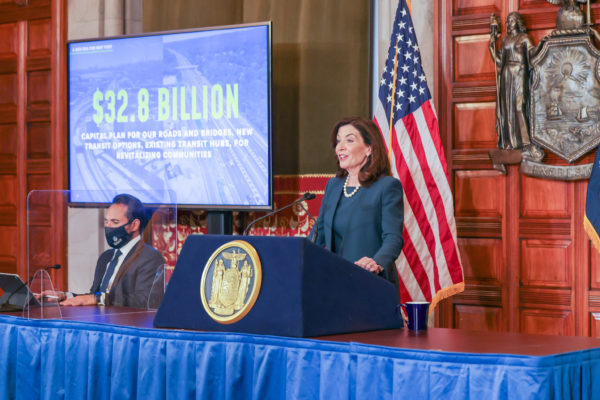New NY budget totals $216.3B; offers aid for some businesses
The New York State Executive Budget for Fiscal Year (FY) 2023 was unveiled today by Gov. Kathy Hochul and Budget Director Robert Mujica Jr., and totals $216.3 billion, an increase of $3.4 billion from the current estimate of what will be spent in FY 2022.
The budget calls for a surplus for the year of $6.4 billion. The state”™s general cash fund balance is expected to shrink by $2.9 billion under the new budget.
Hochul and Mujica spoke about the budget at the statehouse in Albany. Mujica is a holdover from the Cuomo administration.

They highlighted provisions of the budget designed to benefit businesses and individuals, although closer inspection of the budget book shows that some of the benefits would not be realized by intended recipients until 2024 or 2025.
Small businesses would be eligible for a new tax relief program targeting Covid-related expenses for small businesses. The program provides up to $250 million in additional relief to small businesses with the total figure put at $1 billion.
Eligible Covid-related capital investments include, but are not limited to, costs associated with expanding space to accommodate social distancing, HVAC equipment, expenses related to outdoor space expansions, as well as machinery and equipment to facilitate contactless sales.
An element providing limited income tax relief to small businesses was introduced in the budget. It allows qualifying businesses to subtract up to 15% of their net business income or farm income from the amount they have to report to the state for tax purposes. The current subtraction is capped at 5%. The benefit is expanded to be usable by pass-through entities with less than $1.5 million in income earned within New York state. Mujica estimates that 195,000 small businesses would be helped.
The new budget extends aid for theaters and music venues in New York City. The value of the program is doubled from $100 million to $200 million to provide one-time aid to eligible productions and revitalize tourism in the city.
The budget accelerates the phase-in of lower income tax rates for the middle class. The incremental cuts began in 2018 and were scheduled to fully phase in by 2025. The lower tax rates will now be fully phased in by 2023, which decreases state tax receipts by $162 million in FY 2023.
A new proposed property tax rebate program for low- and middle-income homeowners, as well as seniors, will provide up to $2.2 billion in property tax relief to an estimated two million homeowners.
An increase of $2.1 billion in school aid for FY 2023 is recommended in the budget, bringing the yearly total to $31.2 billion.
The budget includes a five-year $32.8Â billion Department of Transportation capital plan that would supplement federal infrastructure spending.
The budget provides for the state to pay a bonus to frontline health care workers of up to $3,000. It”™s to help with recruitment and retention of qualified frontline health care workers and direct support professionals. The amount of the bonus will be based on hours worked and length of time in service.
The budget has money to help promote wind power for generating electricity, with $500 million to be spent on ports, manufacturing and supply chain infrastructure needed to advance the offshore wind industry.
The budget adds a $500 million appropriation to support clean water infrastructure, raising the state”™s total investment to $4.5 billion.
An allocation of $1.8 billion is set for new economic and community development funding and $1.6 billion is dedicated to support the ConnectALL initiative to provide affordable broadband access to New Yorkers.
The budget took note of the start of mobile sports betting in the state. It reported that four operators, Caesars, DraftKings, FanDuel and Rush Street Interactive, began operations on Jan. 8, 2022, after having receiving approval from the State Gaming Commission. On the first weekend, they took in $150 million in bets. More than 650,000 unique player accounts were utilized. The budget book noted that BetMGM, under common ownership with the Empire City Casino in Yonkers, started operations on Jan. 17.
“Our state is in a strong financial position due to a combination of factors, increased tax receipts, a thriving stock market and an influx of federal aid through the American Rescue Plan and the Infrastructure Act, some of which have already been received, some with more still to come,” Hochul said. “As we assess the risks, we do have concerns about long-term economic erosion caused by the pandemic and the impact of inflation and even, hate to say it, but possible resurgence of Covid. We just can’t predict the future. But I want to share with New Yorkers that we are prepared.”